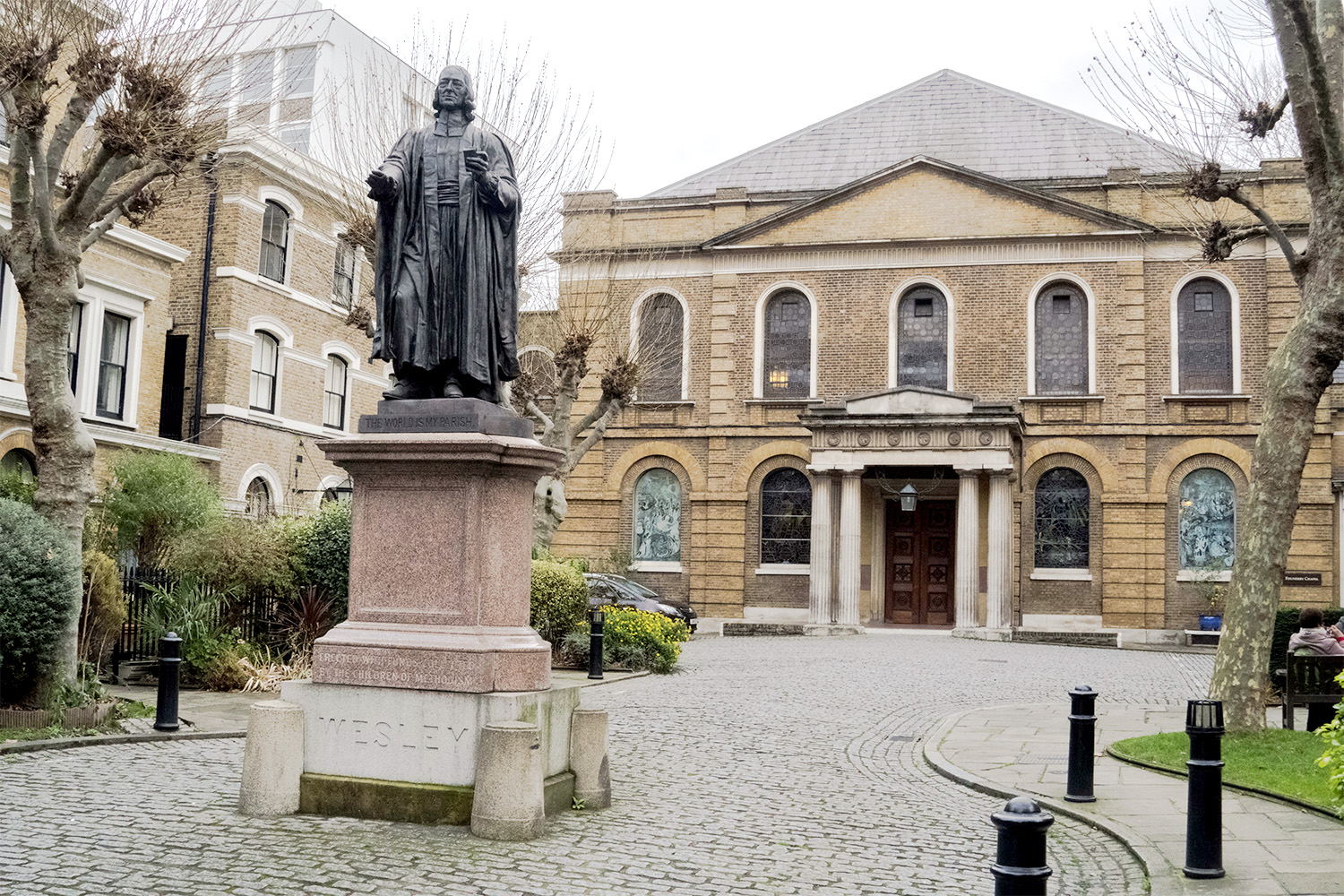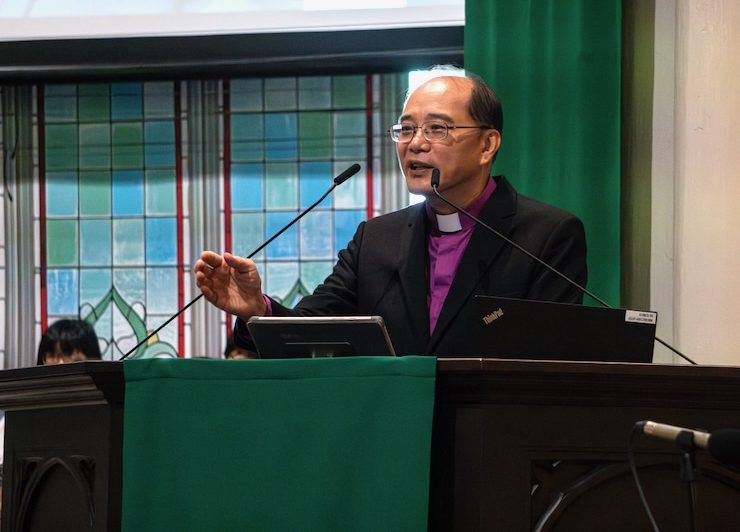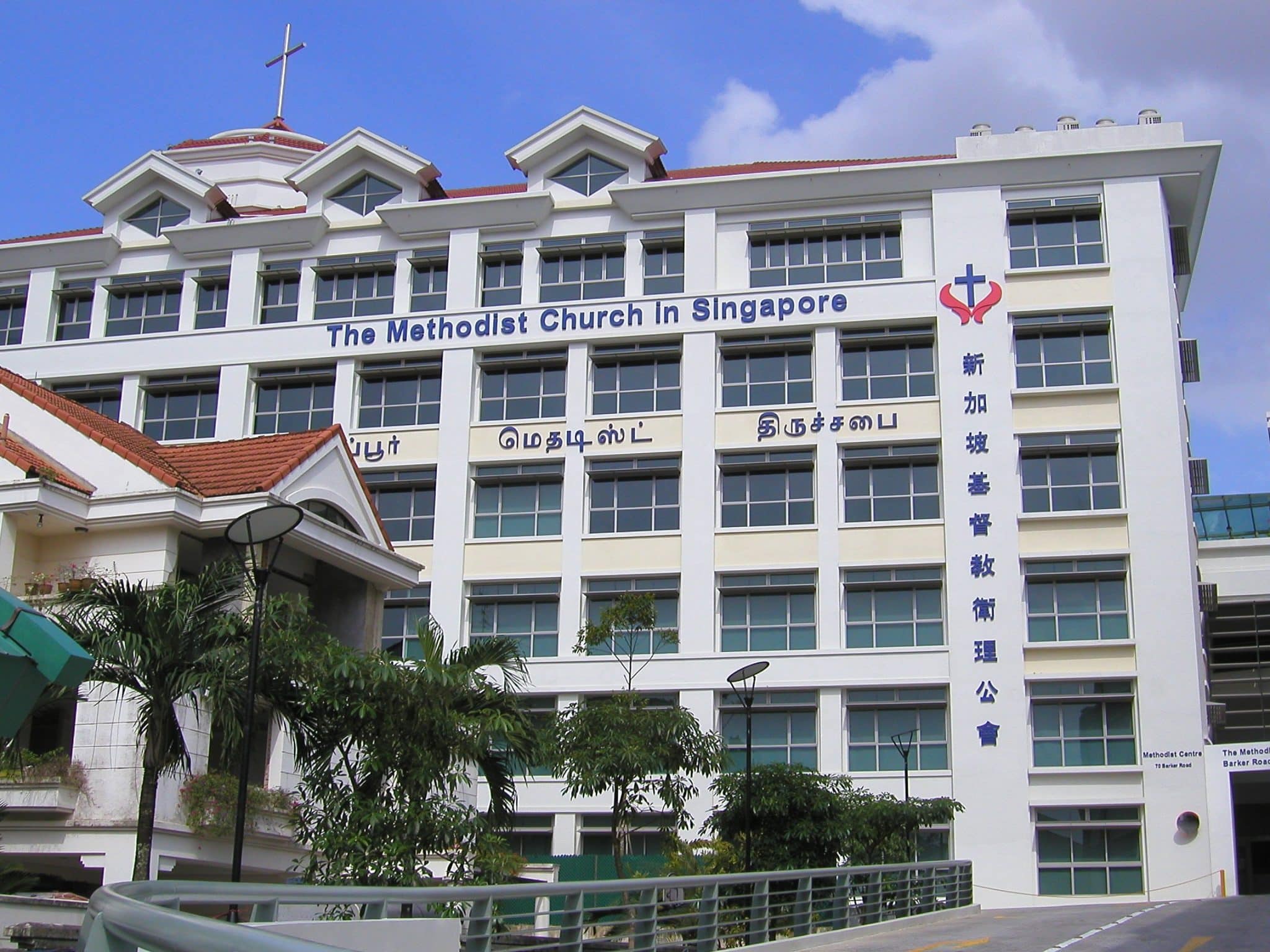A pastoral response to the UK Methodist Church’s decisions on cohabitation and same-sex marriage
This response was written by Pastor Nathanael Goh of the Chinese Annual Conference (CAC) of the Methodist Church in Singapore and was written for pastors and leaders in the CAC.
Rev Nathanael Goh // July 4, 2021, 10:01 pm

Wesley's Chapel, London. Source: " Jwslubbock", Wikipedia Commons.
Dear brothers and sisters in Christ,
On 30 June 2021, the Methodist Church in Britain confirmed some provisional resolutions that were originally set out in their 2019 report, God In Love Unites Us. Amongst some of the resolutions confirmed by the Conference are:
1. In relation to cohabitation – Resolution 10/32
“The Church recognises that the love of God is present within the love of human beings who are drawn to each other, and who enter freely into some form of life enhancing committed relationship with each other, whether that be through informal cohabitation, or a more formal commitment entered into publicly,” the resolution states.
“As a Church we wish to celebrate that the love of God is present in these circumstances, even if that grace is not responded to or even discerned by the people concerned.”
2. In relation to same-sex marriage – Resolution 10/83
“The Conference consents in principle to the marriage of same-sex couples on Methodist premises throughout the Connexion and by Methodist ministers, probationers or members in so far as the law of the relevant jurisdiction permits or requires and subject to compliance with such further requirements, if any, as that law imposes.”
3. Amendment of Standing Orders – Resolution 10/94
“The Methodist Church believes that marriage is a gift of God and that it is God’s intention that a marriage should be is given by God to be a particular channel of God’s grace, and that it is in accord with God’s purposes when a marriage is a lifelong union in body, mind and spirit of one man and one woman two people who freely enter it. Within the Methodist Church this is understood in two ways: that marriage can only be between a man and a woman; that marriage can be between any two people. The Methodist Church affirms both understandings and makes provision in its Standing Orders for them.”
While the provisional resolutions do allow ministers to decline from officiating or participating in the marriage of a couple, based on conscience, there is also an amendment which curiously states that an objection to the marriage may not be made based on sexuality.
Taken together, these decisions are a significant departure from the Methodist Church in Singapore’s theological and ethical positions, as enshrined in our Social Principles of the Methodist Church in Singapore and affirmed in the papers and press releases set out by the National Council of Churches in Singapore (NCCS). This is not the main issue.
We are more concerned that the resolutions and amendments taken by the Methodist Church in Britain represents a departure from the clear and consistent witness of Scripture and tradition in relation to marriage and sexual ethics.
Marriage, for example, has been spoken of in the Christian faith as an image of the indissoluble union between Christ and the Church. The Methodist Church in Singapore also affirms the sanctity of marriage as the foundational unit and basic social environment for the family.
The resolutions set forth by the Methodist Church in Britain appear to go beyond welcome, to affirming cohabitation.
While cohabiting couples are welcome in the Church, as are people who suffer along the entire spectrum of sexual brokenness (such as addiction to pornography, gender dysphoria, same-sex attraction, sexual addiction, et cetera), the resolutions set forth by the Methodist Church in Britain appear to go beyond welcome, to affirming cohabitation.
An affirmation of the possibility of prevenient grace in this context runs the danger of blurring out the need for scriptural holiness and holy living, made possible by sanctifying grace. That grace is possible amid broken humanity is not wrong; to give the impression that this possibility requires our affirmation of human brokenness is erroneous.
Christian ethics and moral theology are not simply an external body of propositional claims or doctrines that stand apart from our historic creedal faith. Rather, it is the shape that our orthodoxy takes in practice.
Our concern with the British Methodist Church’s decision stems from our firm belief that this is a deviation from orthodox Christian ethics. And where Christian ethics is compromised, the undermining of other areas of our creedal faith is seldom far behind.
The provision for objections based on conscience, but not based on sexuality, has the trappings of being a broad-based pastoral approach. In reality, it tilts the scales heavily toward same-sex marriage.
On matters of ethics, prudence in judgement is required. This attempt to open the door for both sides, while heavily favouring one, is disingenuous. The Church has a responsibility to nurture the conscience of the faithful. Christian sexual ethics is formative for, amongst other things, moral agency and conscience. The attempt to cleave the conscience and sexual ethics in these resolutions is unfortunate and serves only to postpone the necessity of practical judgement for the sake of a utopian unity.
The fact is that these resolutions heavily favour same-sex marriage and cohabitation, while simultaneously narrowing the ground on which conscientious objectors may stand.
The attempt to massage both the conscience of the objector and yet uphold the desire of the times leads to a way of a false peace.
The desire to hold off judgment for a tenuous ecclesial unity also appears to motivate the puzzling amendment to the standing orders, an amendment that simultaneously affirms two opposing ways of understanding marriage – one, between one man and one woman, and two, by any two people.
The attempt to massage both the conscience of the objector and yet uphold the desire of the times leads to a way of a false peace.
Even in an area as hotly contested as sexual ethics, the Church cannot abdicate the need for fidelity and clarity in our moral decision-making. In 1 Corinthians 6:19, Paul writes that our body is not our own; it belongs to God. In baptism we are made one by the Spirit into the Body of Christ. How can two opposing ways of joining one’s body to another be meaningfully held together in Christ’s body?
Once again, how can the Church be relied upon to nurture the conscience of the faithful, if its message is that obedience, to what for all one knows is a scriptural command, is simply optional and left to the will of individual ministers?
We are all called to love God, and to love our neighbour. The Methodist Church in Singapore is not a member of the Methodist Church in Britain. The resolutions of the Methodist Church in Britain do not apply to the Methodist Church in Singapore.
The discipline, redemption, and transformation of all our desires is made possible by the Holy Spirit, and best realised through the practice of social holiness.
Despite this, we are all part of the Body of Christ. It is lamentable that the Methodist Church in Britain has introduced resolutions that have moved further away from the ambit of Scripture and tradition. Even in our disagreement, however, let us continue to keep the Methodist Church in Britain in our prayers.
The discipline, redemption, and transformation of all our desires – including sexual desire – is made possible by the power of the Holy Spirit, and best realised through the practice of social holiness.
Let us continue to commit to loving God and our neighbour, through working towards building a community that will support all our fellow brothers and sisters on the journey of entire sanctification – bringing all things and all desires into the true freedom that is found in service to Christ our Lord.
We are an independent, non-profit organisation that relies on the generosity of our readers, such as yourself, to continue serving the kingdom. Every dollar donated goes directly back into our editorial coverage.
Would you consider partnering with us in our kingdom work by supporting us financially, either as a one-off donation, or a recurring pledge?
Support Salt&Light



